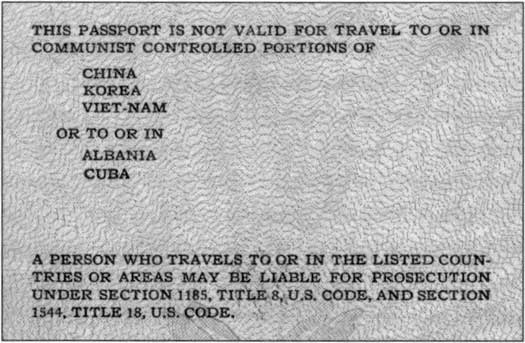Will The Royal Family Get ID?
March 20th, 2006
[…]
Prominent people with views that were considered to be associated with Communism, such as Paul Robeson, were once prevented from travelling abroad by the U.S. government. W.E.B. DuBois, founder of the NAACP, was accused of pro-Communist sympathies and denied a U.S. passport. He renounced U.S. citizenship afterwards. However, the U.S. Supreme Court held in the 1958 case Kent v. Dulles that international travel was an inherent right which could not be denied to American citizens. The US government has two primary methods to get around this ruling though. The first is to declare US passports illegal (or “invalid”) to use for travel into or through a particular country by US citizens without special permission. The second is to ban US citizens from spending any money related to travel into a particular country without special permission. Sometimes the two are combined to make it effectively impossible for everyday US citizens to exercise their rights established in Kent v. Dulles to travel abroad freely. The US government can get away with this because the two methods are not technically travel bans since it’s only a ban on using a passport or spending money. Even so, the US State Department still has the right to screen people before issuing a passport and to revoke a passport.
As mentioned before, at various times, US passports have been issued with a list of countries or regions to which the holder is forbidden to travel using the passport without special permission. These countries have previously included Albania, Cuba, People’s Republic of China, Iran, Iraq, Lebanon, Libya (removed in 2004), North Korea and Vietnam. In 1957 China protested their inclusion in this list and successfully campaigned for its removal. The US State Department oversees these restrictions, and will implement them usually in response to what they perceive to be clear and present dangers to Americans travelling in the aforementioned countries. Despite this, it is alleged that politics appears to be the actual motivation, as US citizens who have defied passport restrictions and gone to such countries sometimes report no danger whatsoever. When the US State Department bans passports from being used to travel to a certain country, it will usually state in the passport or on government websites that the US passport is “invalid” for travel to the particular country. To legally use a passport for travel to such a country, one must obtain a special endorsement or “validation” from the US State Department. Such exceptions to the passport travel bans are usually given to International Red Cross workers on a sponsored mission, those visiting family in such countries or those whose travel “is in the national interest.” Travellers that choose to ignore the restrictions try to do their best not to get their passport stamped or keep any receipts indicating travel to such a country. As of March 2006, US passports are valid for travel to all countries in the world. Although US citizens are no longer banned from using their passports to travel to Cuba, because of U.S. Treasury Department restrictions on U.S. citizens who visit Cuba, that country will similarly not stamp a passport, as it is now against Cuban law to stamp American passports. Thousands of Americans defy this de facto travel ban by going through third countries like Mexico, Jamaica, or the Dominican Republic. US pre-clerance customs agents sometimes catch and report US citizens getting off Cuban planes in Canada and the Bahamas. They then run the risk of being fined by the US government upon return to the United States. As of March 2006, Cuba is the only country that the US government officially restricts its citizens from visiting.
23% of Americans in 2005 have a passport. Unlike most other parts of the world where one needs a passport just to travel 3 hours in the same direction, Americans can travel passport-free within a landmass roughly twice the size of Europe and a passport is not required to travel to Canada or Mexico. Nor do American citizens require a passport to return to the United States from locations in the Western Hemisphere. However, according to a new law, a passport will become necessary in order to return to the U.S. from these locations by air or ship by the end of 2006 and for entry via land border crossings by the end of 2007. In the meantime, for American citizens returning from locations in the Western Hemisphere, a US birth certificate or sometimes even a US driver’s license often is enough.
[…]
The British Monarch
The British Monarch, who is also the monarch of Canada, Australia, New Zealand, et cetera, does not carry any passport, and this is not because of her status as the sovereign of more than one country. The real rationale is that, in a monarchy, passports are issued in the name of the monarch to her subjects, asking foreign governments to grant the passport holders free passage, assistance, and protection. Since the monarch cannot issue a passport to herself – and, in any case, she can personally ask foreign governments for her own free passage, assistance, and protection – she does not carry any passport. […]
http://en.wikipedia.org/wiki/Passport
Does this mean that Her Majesty will be exempt from getting an ID card? If she doesn’t hold a passport, that means that she will never be compelled to be entered into the NIR.
March 20th, 2006 at 6:59 pm
“and a passport is not required to travel to Canada or Mexico.”
Actually, this will probably be a thing of the past fairly soon, at least for Canada… Homeland Security and all. Like it’ll do anything.